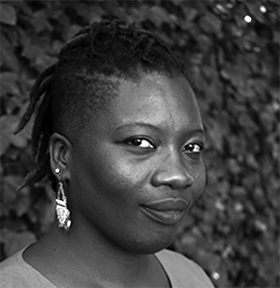For my Brother(s)
My brother was a dark-skinned boy
with a sweet tooth, a smart mouth,
and a wicked thirst. At seventeen,
when I left him for America, his voice
was staticked with approaching adulthood,
he ate everything in the house, grew
what felt like an inch a day, and wore
his favorite shirt until mom disappeared it.
Tonight I’m grateful he slaked his thirst
in another country, far from this place
where a black boy’s being calls like crosshairs
to conscienceless men with guns and conviction.
I remember my brother’s ashy knees
and legs, how many errands he ran on them
up and down roads belonging to no one
and every one. And I’m grateful
he was a boy in a country of black boys,
in the time of walks to the store
on Aunty Marge’s corner to buy contraband
sweeties and sweetdrinks with change
snuck from mom’s handbag or dad’s wallet—
how that was a black boy’s biggest transgression,
and so far from fatal it feels an un-American dream.
Tonight, I think of my brother
as a black boy’s lifeless body spins me
into something like prayer—a keening
for the boy who went down the road, then
went down fighting, then went down dead.
My brother was a boy in the time of fistfights
he couldn’t win and that couldn’t stop
him slinging his weapon tongue anyway,
was a boy who went down fighting,
and got back up wearing his black eye
like a trophy. My brother who got up,
who grew up, who got to keep growing.
Tonight I am mourning the black boys
who are not my brother and who are
my brothers. I am mourning the boys
who walk the wrong roads, which is any road
in America. Tonight I am mourning
the death warrant hate has made of their skin—
black and bursting with such ordinary
hungers and thirsts, such abundant frailty,
such constellations of possibility, our boys
who might become men if this world spared them,
if it could see them whole—boys, men, brothers—human.
Copyright © 2020 by Lauren K. Alleyne. Originally published in Poem-a-Day on August 14, 2020, by the Academy of American Poets.
“I started this poem in March of 2012 as a result of asking myself what it was about the Trayvon Martin case that struck such a deep chord in me. I knew it was something to do with my brother, and as I wrote and tinkered over the years, I realized it was Trayvon’s age and the particular details of the event that reminded me so viscerally of my brother. I’d left Trinidad at the age of 18 and my brother is one year younger than I, so Trayvon was his age, 17, the last time my brother and I shared a home. The circumstance of it all— the walk to the store, the refusal to back down from a fight, all struck me as innocuous teenage boy stuff my brother would totally have done, and knowing and loving him, it seemed insane and terrifying that murder could have been the result of that encounter. I also think it was the first time I confronted the fact that my brother was probably safer as a Black boy/man in Trinidad than in America given how the Black body is read in this country— the first time I actively was glad he wasn’t able to 'make it' here with me. The poem was a documentation of my introduction to that uniquely Black American grief—one born of the senseless loss of loved ones to violent and lethal mis-seeing— which for the first time felt fully like my own grief.”
—Lauren K. Alleyne

